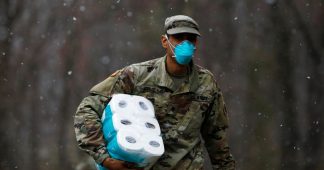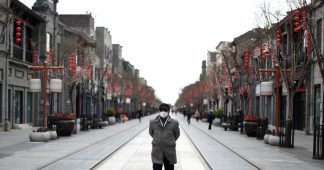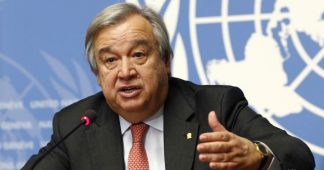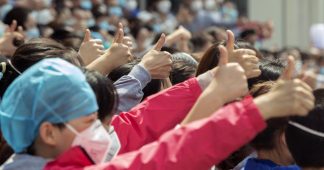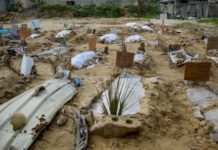March 30, 2020
It’s been described as the public health failure of the century. As the United States leads the world in coronavirus infections, a record number of Americans file for unemployment. Gasping for air, gasping for care; what does global health justice look like? We speak with two Yale professors who say decades of neoliberal austerity make it harder to fight the pandemic. They propose a New Deal for public health. Gregg Gonsalves is assistant professor in epidemiology of microbial diseases at Yale School of Public Health; Amy Kapczynski is professor of law at Yale Law School and co-founder of the Law and Political Economy blog. They are co-directors of the Global Health Justice Partnership.
Transcript
AMY GOODMAN: It’s been described as the public health failure of the century. As the global death toll from the COVID-19 pandemic tops 34,000 with 723,000 confirmed cases, the United States continues to lead in coronavirus cases with over 143,000 known infections — though the true number is certain to be much higher because of the extreme lack of testing. The U.S. is now reporting nearly 2,600 deaths.
After receiving widespread condemnation for downplaying the threat of the virus, on Sunday, President Trump reversed course on lifting social distancing advisories by Easter and extended the government guidelines through the end of April. This comes after he signed the record-breaking $2 trillion coronavirus bill into law Friday that’s been condemned by critics for including corporate slush funds, and a record 3.3 million Americans have filed for unemployment. On Friday, the head of the International Federation of Red Cross warned social unrest could erupt among people who live in poverty and now lack sources of income amid the COVID-19 crisis.
FRANCESCO ROCCA: We have a lot of people who is living very marginalized, that we use all in the so-called black hole of the society, with the daily jobs or other way to live. And in the most difficult neighborhoods of the big city, I am afraid that in a few weeks we will have social problems. This is a social bomb that can explode in every moment, because they don’t have any way to have an income or to find an income.
AMY GOODMAN: When we come back, we’ll be joined by a Yale epidemiologist and law professor, who are proposing a New Deal for public health. Stay with us.
[break]
AMY GOODMAN: That’s the Toronto Symphony playing Aaron Copland’s Appalachian Spring from their homes. This is Democracy Now!, democracynow.org, The War and Peace Report. I’m Amy Goodman. The global death toll from the COVID-19 pandemic nearing 35,000 and the confirmed cases nearing three-quarters of a million around the world. We’re joined now by two Yale professors, who co-authored a piece for the Boston Review headlined “Alone Against the Virus,” in which they argue decades of neoliberal austerity will make it harder to fight the coronavirus pandemic. They write, “At every step, a rapaciously profit-driven health care system and an austerity-ravaged state will make this virus harder to manage. … [I]nequality is itself associated with poorer health outcomes, including lower life expectancies across nations. The coronavirus is about to illustrate that epidemics are great levelers: they can collapse social classes, even if — as with all forms of collapse — the people at the bottom get the worst of it.” They go on to write, “The question today is whether we can learn something from coronavirus that might not only help us mitigate the harm of this pandemic, but build a new infrastructure of care that allows us to better protect the most vulnerable — and us all.”
With us now to discuss their article and their argument is Gregg Gonsalves, assistant professor of epidemiology of microbial diseases at Yale School of Public Health, co-director of the Global Health Justice Partnership, and Amy Kapczynski, professor of law at Yale Law School, co-founder of the Law and Political Economy blog, co-director of the Global Health Justice Partnership.
We welcome you both to Democracy Now! If you can talk about how this pandemic has really applied a microscope to health injustice, not only in this country, but in the world? Amy Kapczynski, why don’t you begin?
AMY KAPCZYNSKI: Thanks so much. So, there are many ways in which the coronavirus pandemic is really revealing the kind of inner logic of our system, right? And so, one piece of it is, think about how our healthcare system is structured. So, you know, the fact that people faced the question of whether they could afford testing or whether they can afford to go in and get treatment — for example, maybe a logical place to go would be to your doctor, but people don’t have doctors that they can go to, right? All of those kinds of features of our profit-driven healthcare system, along with the underfunding of the infrastructure that we need to respond to this — for example, do we have enough hospital beds? Do we have the kind of resources given to our public health experts that can really allow them to respond? — all of those kinds of things are going to make this pandemic far worse than it needed to be.
Another really important piece of this is our carceral state. The United States is extraordinarily extreme in the degree to which we put people in prison, and we use kind of carceral punitive measures to address questions of migration. This epidemic is going to spread like wildfire in prisons. We know that prisons are drivers of epidemics, and we know that all of those who are being held in immigration detention are at really grave risk. And those kinds of things, the fact that we have approached other people in our society with this kind of punitive carceral approach, is going to mean that the epidemic is going to be extraordinarily hard to control in those places. And because we’re all connected, it becomes harder to control elsewhere.
AMY GOODMAN: Gregg Gonsalves, if you can talk about the failure of the response, the astounding fact that President Trump keeps boasting that he applied a very early travel ban, and yet, even with this early travel ban, did not push for the access to tests, which are perhaps of the number one public health measure to prevent the spread, and also the protective gear to the heroes and heroines of the United States, the medical professionals all over this country, who are the hardest hit right now?
GREGG GONSALVES: Sure. So, as you mentioned, this is the public health failure of not this century, but probably the past hundred years, back to the 1918 great influenza epidemic that swept across the globe. We knew in December that this was going to be a global pandemic. It was a coronavirus like SARS which swept over the world, and we had three months to prepare. There were reports internally circulating in D.C., even, let’s say, early January, to give us a little bit of more breathing room for the public health response, but the government sat on its hands. First it said, “We’re not going use the WHO, World Health Organization, tests; we’re going make our own.” And, of course, it ran into problems in the implementation of that test and had to start from scratch. So we got three months into the pandemic with no real public health response from our national government.
Then we’ve had this sort of contradictory set of pronouncements from the White House. The president underplays the seriousness of the epidemic, while scientists like Dr. Anthony Fauci of the National Institute of Allergy and Infectious Diseases says we could see 200,000 deaths in this country. So we’ve had sort of a collapse of leadership, from the CDC all the way up to the White House, in which we were caught, frankly, with our pants down for a pandemic that was obviously sweeping the world. As early as January, we could have anticipated this and acted.
AMY GOODMAN: So, now, as we move forward, Professor Gonsalves, from an epidemiologic perspective, how do the neoliberal policies of the United States — and define that term, “neoliberal” — the kind of private healthcare system we have, how does it contribute to, accelerate the pandemic in this country?
GREGG GONSALVES: Well, you know, I’d let Amy define neoliberalism, but I think what we see here is that even in the wake of the Affordable Care Act, we still have millions of people uninsured in this country. We have people underinsured. As Amy also suggested, we have a whole class of people who are outside of our circle of care — undocumented immigrants, prisoners, the homeless. And in order to sort of contain this epidemic, we need to know, through testing, where it is and to what extent, but we also have to be able to get people into care to be treated and taken care of, to be able to get them the resources they need to do social distancing. Social distancing is our main public health tool against this virus. And unlike other countries in Europe, such as Denmark, which is providing 80% of salary support to people in order to let them be able to stay home and a whole set of other social services we don’t give in this country to our populace, we’re going to make it very, very difficult for people to prevent the disease from spreading in their communities. And if this is what neoliberalism is — dog eat dog, every man and woman for himself — then maybe that’s a good definition for what it is. And it’s hazardous to your health.
AMY GOODMAN: Professor Gonsalves, you go back with Dr. Fauci, way back, to the years of massive AIDS activism. He was the leading figure during the Reagan years around AIDS. Can you talk about your relationship with him and his approach to this pandemic? Trace the trajectory, from AIDS to what we’re seeing now.
GREGG GONSALVES: Well, Dr. Fauci, yes, has seen the AIDS epidemic. He’s seen Ebola. He’s seen H1N1, SARS. He’s been on the frontline of all these epidemics. And, you know, early relationships with him were contentious, you know, protested against him, locked horns with him many times in the late ’80s, early ’90s. But what I —
AMY GOODMAN: You were part of ACT UP.
GREGG GONSALVES: I was part of ACT UP. But what’s been clear over the past decade or more is that he’s turned out to be a very trustworthy, science-based, evidence-based figure for helping the United States understand how to respond to infectious disease, such as during the Ebola crisis when he hugged a nurse who had been treated for Ebola at the National Institute for Health. He’s been the one person on the podium at the White House who has been able to sort of speak truth to power and say what the facts are, rather than what the spin is coming out of the vice president, the president, Ambassador Birx, Surgeon General Adams and the rest.
AMY GOODMAN: Amy Kapczynski, so I’m going to leave it to you to define these neoliberal policies that you have said have worsened this pandemic and the effect of it in the United States, and to lay out what our system is today. Now insurance companies that say they will not only not charge for testing, but not charge for treatment, are called heroes in a private system, but afterwards will immediately increase people’s insurance costs. What is a New Deal for public health? But begin on the issue of neoliberal policies.
AMY KAPCZYNSKI: Sure. So, neoliberalism is commonly defined by scholars as a kind of political movement that in fact sought to change our — the relationship between, effectively, kind of the market and democracy. So, people often think of it as coming to prominence in the 1980s and the 1990s, think of the Reagan and Thatcher programs and the Washington Consensus as key pillars of neoliberal policy approaches. So, they demand, for example, deregulation, the starving of the state, the expansion of the profit motive to more and more parts of society, and the organization of more and more parts of society according to market logic, right? So, deregulation, privatization and the priority given to markets over society and over people.
So, with that sort of in mind, I think it’s pretty clear to see how we have built not only a healthcare system, but also a system of work, for example — right? — where there’s no sick pay for so many millions of Americans, they can’t stay home when they’re sick — that’s driven by a profit logic, right? That’s driven by an extractive idea about how business should relate to human beings. And it’s one that underlines the health of all of us, right? Because if people — as everyone’s become really aware of at this moment, if people can’t stay home when they’re sick, then none of us can be protected from things like the coronavirus — right? — and many things beyond that. So, that kind of profit logic, the same logic that starved the state — right? — that has — you know, one of the things we talk about in our piece is the way that public health has been underfunded and the way that Donald Trump is like the apotheosis of this, right? He says at some point in one of these early press conferences that he didn’t want a lot of people sitting around preparing for epidemics because that was kind of wasted overhead, right? I mean, that kind of logic is what leaves us unprepared to deal with these deep structural vulnerabilities and to deal with crisis. And that’s really where we’re at. We don’t have the resources to hand. We don’t have the institutions that we need to get care and money to people quickly. And we don’t have ways to support people to do what our society needs us all to do right now, which is to stay home and take care of one another by staying home and engaging in social distancing.
So, what does a new system look like? Well, one of the key pillars, I think, of a New Deal for public health, as Gregg and I see it, is of course something like Medicare for All, so that we need people to be able to access care in this country without concern that they’re going to go bankrupt — right? — which is what so many people face today, and we need to extend the circle of care to everyone, so that we’re all protected and so that we can all then be connected in this circle of care.
So, beyond that, of course, there are things like sick pay and rights for workers. You know, I think you’re going to see that places that give workers rights are going to deal better, and they’re going to contribute more, to our [inaudible] than places that treat them as disposable. So we need more power for workers. We need more sick pay. We need an expansion of the welfare state to keep people in a position where they can do not just the productive work of our society, but the reproductive work — right? — the caring for one another, which is what we’re all doing right now, staying home, caring for one another. And that just doesn’t count in most measures of the economy, right? Staying home doesn’t count. Staying home is not productive in the way that people ordinarily think about the economy. And the system of kind of neoliberal economics that we’ve been given is one that systematically exploits the kind of care that we give her one another, that’s unpaid, and that doesn’t provide us with the resources that we need to kind of reproduce ourselves as a society. So, we need those resources.
We also need to roll back the carceral state — right? — that is spending extraordinary sums and putting people in extraordinary grave danger even in ordinary times — right? — and providing us with none of the things that we really need to be able to address the underlying causes of things like crime in our society. So, all of those pieces together, along with a recognition that in fact the economy is something that we build, we build it together — and we need to build an economy that is worthy of the society that we want to live in, rather than one that treats people as disposable and that kind of exploits our planet and also our forms of care in the way that this one does today.
AMY GOODMAN: And finally, Gregg Gonsalves, where does Medicare for All fit into this picture? How do you see it saving the lives of not only the most vulnerable, but of everyone?
GREGG GONSALVES: So, it’s interesting. There’s a piece in the Times today by Emmanuel Saez and Gabriel Zucman from Berkeley that talk about COVID Care for All. And I think we’re talking — I think that the neologism is interesting, because this is what has brought us to this brink. The failure of care in the United States, which is not recapitulated anywhere else in the industrialized world, has led us to a point where — depends on who you are whether you’re going to get sick or whether you’re going to get well, whether you’re going to get infected with coronavirus or you’re not going to get infected with the coronavirus. So, unless we take care of each other from coast to coast, from north to south, east to west, we’re going to be vulnerable as the — we are all as vulnerable as the most vulnerable person in our society. And so, unless undocumented immigrants, unless the incarcerated, unless the homeless are brought into the circle of care, with healthcare universally accessible across the United States, there will always be somebody who’s going to get sick who could be the spark that sets off the next epidemic.
AMY GOODMAN: Gregg Gonsalves and Amy Kapczynski, there’s so much more to talk about. We will link to your pieces. Both at Yale, Yale University, Gregg Gonsalves is an epidemiologist at the Yale School of Public Health. They are co-directors of the Global Health Justice Partnership.
When we come back, we look at how more than 100,000 homeless people, from New York to Los Angeles to Oakland, are at great risk as this pandemic spreads. When political leaders say shelter at home, what about when you don’t have a home? Stay with us.
[break]
AMY GOODMAN: “Ojitos Verdes,” “Little Green Eyes,” performed via video conference by Maríachi Escandon of Roma Middle School in the border town of Roma, Texas, in the midst of this pandemic.
